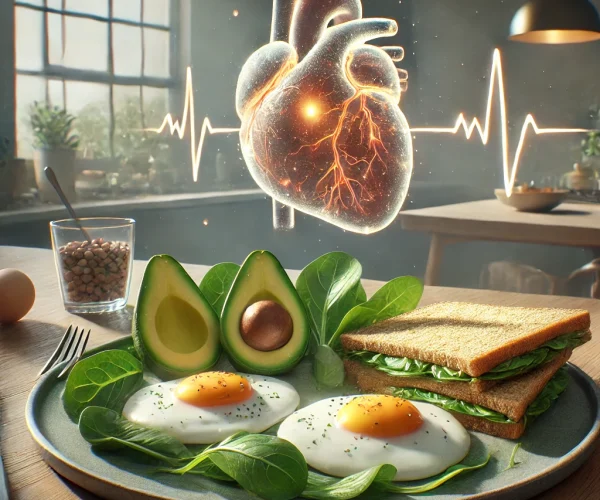Can Eating Eggs Prevent a Stroke? The Surprising Truth
Eating eggs may lower stroke chances when enjoyed in moderation, since they provide nutrients that benefit heart and brain function. Results can vary from person to person. For a clearer understanding and practical guidance, please go through the details below.

Eggs often spark strong reactions—some folks champion them, while others avoid them entirely. For many years, critics pointed toward high cholesterol content and warned that frequent consumption might lead to heart complications and other serious outcomes. Newer studies, however, are beginning to shift that viewpoint, suggesting that eggs could offer unexpected protection against one of America’s most concerning cardiovascular threats.
So what holds up under closer examination? Could adding a few eggs to a morning routine actually lower chances of major circulation-related harm, or is this simply another nutrition trend waiting to fall apart? Let’s look deeper into current findings, separate solid evidence from old assumptions, and see whether eggs deserve a place in an eating pattern focused on stronger circulation and long-term wellness.
Rising Concern Over Cardiovascular Events in U.S.
Before diving into this subject, it is important to highlight a serious condition affecting many individuals each year.
Close to 800,000 people across U.S. experience a potentially fatal crisis annually, placing it as fifth leading cause of death nationwide. Two primary forms exist:
One form develops when a clot interrupts blood flow toward a vital organ.
Another form occurs once a vessel bursts, leading to internal bleeding.
Major driving factors include high blood pressure, smoking, elevated blood sugar, along with poor eating patterns. Encouragingly, about 80% of cases can be avoided, showing how nutrition choices may shape long-term outcomes.
This naturally shifts attention toward a particular food worth examining.
Eggs: From Villain to Hero?
For many years, eggs carried a reputation as a dietary villain due to high cholesterol content. One large egg contains roughly 186 mg, all concentrated in that golden center. Specialists once argued that frequent intake could send LDL (often labeled “bad”) levels soaring, fueling concerns about cardiovascular problems.
Recent research, however, offers a surprising twist: cholesterol coming from food sources does not influence your own levels as strongly as earlier assumptions suggested.
Scientific Evidence Overview
A 2016 investigation published in Journal of American College of Nutrition reported that consuming up to one per day did not raise chances of cardiovascular complications and might even bring those chances down.
A 2018 meta-analysis in Heart tracked over half a million participants and showed that individuals who had one each day experienced an 11% drop in likelihood of cardiovascular trouble compared with those who rarely added eggs to daily meals.
A 2020 project featured in BMJ suggested that moderate intake (around three to six weekly) aligned with improved cardiovascular outcomes in adults without existing conditions.
So, what drives this unexpected pattern? If eggs contain cholesterol, why doesn’t regular intake create problems?
Why Eggs Might Protect Against Stroke
Turns out, they aren’t just cholesterol bombs—they’re packed with nutrients that may counteract certain risks.
1. They’re Loaded with Essential Nutrients
They contain:
Choline – Supports brain function and reduces inflammation.
Vitamin D – Low levels are linked to higher concerns.
Omega-3s (in pasture-raised varieties) – Help reduce blood clotting and inflammation.
Antioxidants (lutein & zeaxanthin) – Protect blood vessels from damage.
2. They Improve Cholesterol Profile (Yes, Really!)
While they do contain cholesterol, they also raise HDL (“good”) cholesterol, which helps clear LDL from your bloodstream. For most people, consuming them doesn’t significantly increase bad cholesterol—unless you’re genetically predisposed (more on that later).
3. They Help Control Blood Pressure
They’re a great source of potassium and protein, which help regulate it—a major factor in certain risks.
4. They Keep Blood Sugar Stable
High-carb, low-protein breakfasts (like cereal or toast) can cause spikes, leading to inflammation. Since they’re high in protein and fat, they help stabilize levels, reducing another potential contributor.
But Wait—Can Eggs Cause Strokes in Some People?
Before you begin eating a dozen daily, consider these points:
For Those with Blood Sugar Concerns
Studies suggest that people living with diabetes could have a modestly higher risk of some cardiovascular complications when consuming large amounts. Exact connections remain unclear, so monitoring portions carefully and consulting a medical professional is recommended.
If Cholesterol Affects You Strongly
About one in four people metabolizes dietary cholesterol differently, which can result in significant rises in LDL levels. For those with a family history of elevated numbers, periodic testing can clarify individual effects.
When Prepared with Unhealthy Additions
On their own, they’re nutritious—but loading them with excessive fats, sodium, or processed meats changes the picture. Preparation methods make a big difference.
How Many Should You Eat to Support Your Well-Being?
Based on current research:
One daily is generally safe for most and might help reduce certain risks.
Up to three per day hasn’t been linked to harm in healthy individuals, though further studies are required.
If you have certain conditions like elevated cholesterol or blood sugar, limiting to three to six weekly and checking your numbers is wise.
The Bottom Line: Should You Eat Eggs to Prevent a Stroke?
Research shows that for most Americans, moderate egg intake does not raise chances of circulation-related harm and may even offer protective advantages.
Findings remain consistent across multiple studies: for many individuals, sensible portions do not increase odds of related complications and may contribute to stronger cardiovascular function.
Eggs deliver an impressive mix of nutrients—protein, vitamins, and antioxidants—that nourish heart function as well as mental clarity. Unless a clinician gives different guidance, avoiding eggs usually isn’t necessary.
Enjoy them with confidence—whip up an omelet, scramble a few for a morning meal, or keep boiled portions on hand for a quick bite. Flavor, energy, and sharper thinking can all improve when eggs become part of daily routines.
One small caution: reconsider pairing eggs with highly processed meats, since that combination may counteract many of eggs’ advantages.
Final Thought
Nutrition science is always evolving, but one thing’s for sure: demonizing whole foods based on outdated fears does more harm than good. Instead of worrying about cholesterol myths, focus on a balanced diet, staying active, and regular check-ups—because that’s what truly supports long-term wellness.
FAQs About Eggs and Circulatory Concerns
Do Egg Whites Provide Same Advantages as Whole Eggs?
Not entirely. While egg whites are rich in protein, many nutrients linked to circulation and cognitive function—such as choline, vitamin D, and antioxidants—are concentrated in yolks. Eating whole eggs delivers complete benefits, whereas skipping yolks means missing key elements.
Are Organic or Free-Range Varieties More Effective?
Possibly. Eggs from free-range or pasture-raised sources often have higher levels of omega-3 fatty acids and vitamin D compared with standard options. These nutrients may help reduce inflammation and support healthy blood flow, contributing to overall wellness. When feasible, selecting higher-quality eggs can be a worthwhile choice.
Can Eggs Reduce Risk of Recurrence?
Evidence is limited but suggests that incorporating high-quality protein sources may support recovery and lower the chance of future issues by promoting vascular health and moderating inflammation. Individuals with relevant histories should consult a physician to tailor dietary choices to their needs.
Do Eggs Interact with Blood-Thinning Medications?
Eggs contain small amounts of vitamin K, which can affect certain blood thinners. Impact is generally minor unless consumed in large quantities. Consistency in vitamin K intake is key, and discussing specifics with a medical professional ensures safe management.
Does Timing Matter for Benefits?
Some research points to morning consumption as particularly beneficial. Eating eggs for breakfast may help regulate blood sugar and blood pressure while curbing mid-day cravings—both factors linked to long-term wellness. A protein-rich start can also support overall energy and metabolic balance.



